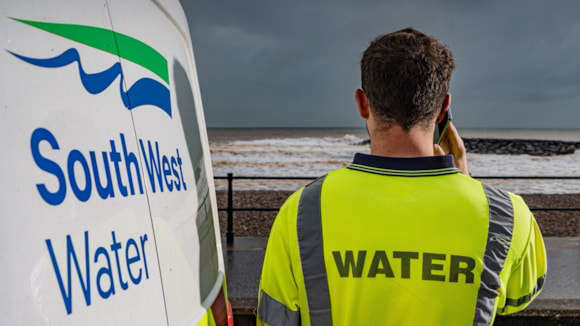
As extreme weather becomes more common, South West Water’s teams are working harder than ever before to ensure essential services are protected across the region.
As extreme weather becomes more common, South West Water’s teams are working harder than ever before to ensure essential services are protected across the region.
Following the wettest February on record this year, weather experts say climate change is leading to more intense and frequent heavy rainfall events, meaning South West Water is increasingly having to prepare for periods of bad weather.
Heavy rainfall puts added strain on the wastewater network as sewers fill up with rainwater from the local area, increasing the risk of bursts and other issues. The water company therefore has a severe weather protocol designed to reduce the risk of any disruption and protect the network.
This system features weather forecast triggers which lead to a co-ordinated response by South West Water’s teams. Once a particular forecast trigger is hit, preparations begin to ensure that drinking water and wastewater systems are ready to cope.
George Wilson, South West Water’s Central Incident Response Manager, said: “Our protocol gives us the best opportunity to prepare for adverse weather. Once a trigger is activated, our teams work tirelessly to ensure our assets are prepared to withstand the impacts of severe weather.
“We also implement extra measures depending on the severity and type of weather to further support our operations, and to reduce the impact on our assets, customers and the environment.
Preparations are tailored to each specific weather event. For example, if thunderstorms and high winds are forecasted, South West Water moves its key sites to generator power to protect against power cuts. It also enlists the help of third parties, including tree surgeons, to ensure sites are kept safe.
In the case of heavy rainfall, especially following dry periods, the focus shifts to optimising the company’s wastewater systems. This includes making sure storm overflow tanks are empty, performing additional cleaning and maintenance of the network, and checking that all systems are operating at peak performance to manage the extra demand.

 Special meeting called as election delay branded ‘deeply dangerous’
Special meeting called as election delay branded ‘deeply dangerous’
 Rural MPs vow to continue to fight for farmers as controversial bill proceeds through parliament
Rural MPs vow to continue to fight for farmers as controversial bill proceeds through parliament
 RNLI offers essential safety advice for cold water dippers this festive period
RNLI offers essential safety advice for cold water dippers this festive period













